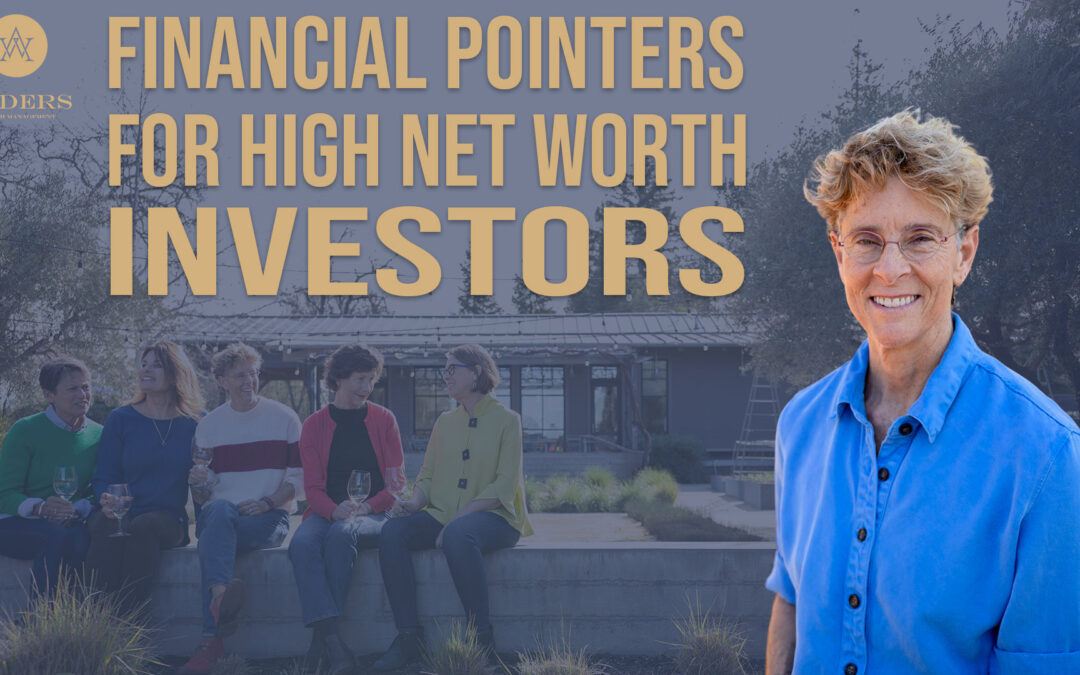
Financial Pointers for High Net Worth Investors
Hello and thank you for stopping by today we are going to talk about pointers for high net worth investors.
My name is Tina Anders. I am the Fee Only fiduciary Certified Financial Planner for my firm located here in Petaluma, California, Anders wealth management. Serving primarily Napa, Marin and Sonoma counties. I am going to talk about pointers for high net worth investors, again thanks for stopping by.
So, keep saving, don’t spend all of your investment returns. You know this. Save wisely and invest wisely. You can focus on increasing your cash inflows, as well as reducing your cash outflows, thus increasing your overall wealth. While you, as a high net worth investor, may not think of yourself as a saver or someone that needs to save, you know that living below your means will allow you to achieve and maintain your desired level of wealth in a shorter amount of time.
Point number two, invest not only in United States but also in the European Union and also emerging markets. Developed countries, such as the United States and the European Union are thought to offer the most investment security, but look beyond your borders to frontier and emerging markets. Some of the top countries that the ultra wealthy are investing in are Singapore, Chile and Indonesia. Of course individual high net worth clientele, you need to do your research to make sure that these countries (or let me do it) to make sure these countries fit into your overall investment strategy and your portfolio.
Pointer number three, don’t worry about keeping up with the Joneses. Now, I know you know this cognitively but do you really know it? Many smaller investors are looking at what their peers are doing. And they try to match or beat their investment strategies. However, not getting caught up in this type of competition is critical to building personal wealth. You, a high net worth investor, know this and you should establish personal investment goals and long term investment strategies before making decisions about your investments. High net worth investors envision where they want to be in 10 years 20 years and beyond especially considering their errors. You need to adhere to an investment strategy that will get you there. Instead of trying to chase the competition or becoming frightened of the inevitable, the inevitable economic downturn, stay the course with a strong, stable portfolio.
Next pointer, have your portfolio designed for a reliable stream of income, stability, and growth. I want to just make a note here, annuities are not necessarily the best way to do this. Although a lot of people turn to annuities for reliable streams of income. There are ways to structure your portfolio for long term growth while providing a reliable and predictable income stream each year. I do this for my clients all the time. I have structured portfolios to 2008; not one client had to adjust their lifestyle. I have structured portfolios to deal with the current Covid situation. Clients are not having to adjust their lifestyle. There are ways of structuring portfolios to provide reliable and predictable income each year, no matter what’s going on in the markets.
Next pointer, rebalance your portfolio. What does that mean? I’ve talked about it in another video and I want to just cap on it right here. So, rebalancing, if you have a portfolio that is say 50% bonds and 50% stocks. Well, if stocks go up, that means the value of the stocks is higher now than 50% of the portfolio. So, you might be sitting at a 60% stocks, 40% bonds, or even more extreme than that. So, you want to rebalance back to your 50/50 if in fact, that’s your allocation. Rebalancing regularly is very important for your portfolio and for your long term stream of income and your long term wealth. You want to remain diversified, adequately diversified. You want to remain properly diversified. Even if some investors have specific allocation goals. These are high net worth people as well as not high net worth people. They often don’t keep to the rebalancing and they allow their portfolios to skew too far one way or the other. So, rebalancing is very important. A balanced portfolio typically includes the right mix of cash, stocks and bonds based on your age, your risk tolerance, your comfort zone and other factors that we would consider and that you need to consider when allocating your portfolio. For the ultra wealthy rebalancing is a necessity.
Work with a fee only fiduciary Certified Financial Planner to help you achieve your goals by staying on track.
Thank you for stopping by today. If you have comments, please do so below, including comments about the video, comments about questions that you might have for me, and or topics of interest for future videos. Happy to accommodate you. Tina Anders Anderswealth.com. Thanks again for stopping by, in your corner always.

